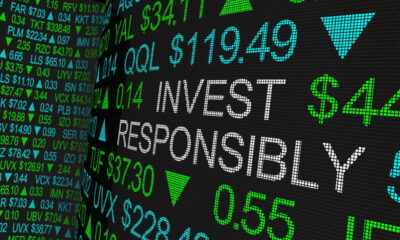

Economy
We’ve had 20 years of sustainable investment and is the world getting any better?
Raj Thamotheram and Tim MacDonald dig into the impact sustainable and responsible investment (SRI) has had so far. They argue the industry could be the foundation from which systemic financial sector change could happen, and end with four actions which they consider could set us solidly on the path to the next evolutionary stage of investing responsibly.
This article originally appeared in Blue & Green Tomorrow’s Guide to National Ethical Investment Week 2013.
National Ethical Investment Week (NEIW) is an amazing achievement, and we have sustainable and responsible investment (SRI) colleagues in other parts of the world who would love to emulate it.
So why the challenging title?
It is inspired by a book called We’ve had a Hundred Years of Psychotherapy and the World’s Getting Worse. The book “exposes psychology as an ideology that collaborates with traditional notions of individuals” and, for that reason, fails to deliver on its initial promise.
And this got us thinking.
In what way does today’s definition of SRI challenge the dominant investment paradigm? And in what way does it get co-opted, even facilitate our present dysfunctional market system? Put simply, is SRI doing what it could be doing to transform the financial system?
For those who care about the environment or social justice, there is little doubt that the investment system as it operates today is a major part of the problem.
Ethical investment, then socially responsible investing and most recently mainstreaming or integrating environmental, social and governance (ESG), stewardship or active ownership and impact investing are all important and hopeful responses to this situation. And there is also little doubt that the responsible investment industry in the UK has punched well above its weight and much of this is unseen by the public.
But for all the commitment and energy of the practitioners of these new approaches – which for convenience we use the portmanteau terms “investing responsibly” or the “responsible investment movement” or sometimes just SRI – the investment system as a whole largely goes on with business as usual. Denialism is very tempting – “look, we are doing much more than the rest are!” – but unless we deal with this inconvenient reality, the responsible investment movement will never fully deliver on its potential.
What we seek to do in this article is explain how this responsible investment movement could become the catalyst for paradigm change. At the core of what we say is a recognition that the problem is not just out there – it is within the players that provide these specialist products and services, and that as fractals of the wider system, paradigm change can begin here.
We start by showing that the core problem with the investment system is excessive trading with the consequent focus on the very short-term and a disregard for anything that is not captured by ‘the number’. We then explain how the primary cause of excessive trading is that pension funds and other institutional investors are participating in securities trading as a default form of investing and we show that this has proven not to be fit for purpose because it leads to systemic risk and system failure. We then explore, very briefly, how the fundamental solution is for pensions to evolve a new form of investment that is more fit for their long-term and inter-generational purposes.
This is where individuals who are already investing in SRI products come in. Such customers have both a personal interest and the citizenship credibility to help wake pensions up to this new reality. The outcome will be both better pension performance but also a better world.
Moreover, if pension-funded trading continues to dominate the ticker tape, all forms of SRI will continue to be drowned out by the noise of well-incentivised professional speculators speculating with our retirement savings. Like vaccination, we need to get to a higher critical mass to have real impact.
Of course, the final solution has to come from inside the pension industry itself, but individuals can help by raising the hue and cry as a core part of SRI. Critically SRI customers must, collectively, make sure their own preferred investment providers lead the way on the needed changes.
The prize is huge: as pensions reduce their participation in speculation, the influence of real investors and specifically those concerned with societal and environmental impact of investment activity will regain their lost prominence and investing responsible will become the only truly prudent way to participate in the investment system.
 John Kay, the highly respected Financial Times economic commentator, has shown without doubt that the investment system is characterised by excessive trading and this is getting worse. The collateral damage includes a focus on the very short-term, a disregard for negative environmental and social externalities that are not captured in the financial statement and powerful incentives to do whatever is needed to keep the share price rising.
John Kay, the highly respected Financial Times economic commentator, has shown without doubt that the investment system is characterised by excessive trading and this is getting worse. The collateral damage includes a focus on the very short-term, a disregard for negative environmental and social externalities that are not captured in the financial statement and powerful incentives to do whatever is needed to keep the share price rising.
Hence the serial mergers and acquisitions, even if many or most subsequently fail. And the excessive remuneration, to attract and motivate those celebrity executives who can magically deliver this never ending share price increase, until they don’t.
Survey after survey shows investors have huge power to affect corporate behavior. And today the current mass of investors – including, importantly, pension investors – are using that power to affect corporations in the wrong ways.
In a very illuminating study, Duke University economists found that the majority of chief financial officers (CFOs) would trade off practically all forms of productive investment to protect ‘the quarterly number’, because that is what they hear investors demand. CEOs of companies that are part of the UN Global Compact say investors are the biggest obstacles they face to doing sustainability.
In truth, it is not end investors that companies are listening to. It is traders.
Even mainstream economists like Robert Solow, a well-respected Nobel prize winner, are going public with their assessments: “The bulk of incremental financial activity is trading, and trading, while it may provide a little useful public information about market opinion, is largely a way to transfer wealth from those with inferior information and calculation ability to those with more. There is no enhancement of economic efficiency to speak of.”
What is causing this rise in trading?
That is a story of ticker tape trading. Investment systems which were originally designed with the noble purpose of empowering individual participation in wealth creation through capital appreciation over the long-term have been transformed into a zero-sum game of extracting value from others by outsmarting the other guy in the short run.
This is not investing. It is speculation. And this rise is speculative trading coincides with a rise in pension investing.
According to a recent Towers Watson study, over the 10-year period from 2002 to 2012, money entrusted to pensions and other professionally managed retirement plans doubled in size, from $15 trillion to $30 trillion. These professionally managed, purpose-driven funds now control almost half the estimated $60 trillion held for investment in the global economy today.
Pension participation in speculative trading is creating a new risk to the pensions themselves, but also to the trading markets and to the entire economic system. Experts call it systemic risk. It is the risk that the entire ticker tape becomes unsustainably overvalued, so that prices will correct not just for a few trades, idiosyncratically, but across the entire market, and all at once. It is the risk that overvalued equities will lead to unsound lending and bring about the collapse of the money system, grinding the global economy to a halt. It is the risk we realised most recently in 2008. And if not the financial bubble, then the carbon bubble and so it goes on.
The dysfunctionality of pension participation in ticker tape trading can be seen in how their own investment supply chain, namely the sell side and rating agency analysts, operates.
There is now no doubt that these agencies proved incapable of warning about serious risks, like BP’s Gulf of Mexico disaster or the global financial crisis. That the sell side and credit research models are broken is fully accepted, at least in private.
But where is the clamour from all the players in the responsible investment movement for major change? The UN-backed Principles for Responsible Investment (PRI) accounts for 10% of the investment market. If PRI members really wanted change, it would happen.
Instead, most firms who sell responsible investment products or services imply that as an individual firm they can get around this systemic failure. This is nonsense.
What do board members do to get an ‘independent’ assessment of their companies? They go to sell side and credit rating agency reports. Who do most senior execs think about trying to keep happy more than anyone else? Sell side and credit rating analysts, and for good reasons – their stock options and career prospects depend on this. And do we really think the buy side, constrained by benchmarks and tracking errors, will really completely ignore consensus numbers from the sell side? No, the reality is that this deeply dysfunctional part of the institutional investment system is one of the big reasons why retail SRI customers are having so little impact.
Another big obstacle to investing responsibly is the other informational intermediary serving the pension industry, namely investment consultants. They too have largely succumbed to “business as usual” of investing as speculation, either by ignoring the issue or having specialist units which do interesting thought leadership but, to generalise, have weak influence on their front-line colleagues.
The solution here is to modernise legal standards of fiduciary prudence, to require trustees to insist that intermediaries evolve and adapt to the learning of the lessons of the newly discovered systemic risk. Encouragingly, the UK law commission seems to be moving in this direction but time will tell if they too are lobbied to water down any changes.
The bottom line is that standard practice of fiduciary investing must be upgraded. The good news is that there are an increasing number of experienced insiders who are working on what this means in practice – Paul Woolley (UK), Keith Ambachtsheer (Canada) and Jon Lukomnic (US) to name just three.
But as yet their thought leadership is having much less real world impact than should be the case and this is where readers of this article – who have a stake in the SRI world – come in.
Here are four pillars for how the new paradigm can be built and everyone has a role to play.
1. We need to increase the retail base for SRI
About 2% of the UK retail investment market is SRI. But this is the same figure in the US and only half of what the Australians have managed. And this is much less than Fairtrade sales. Surely we can do better? Unless we do, the SRI advocates within fund manager firms will continue to have low influence. And investment firms that are SRI friendly will continue to be ignored by their mainstream peers.
Individually, we can allocate more to SRI funds and less to non SRI funds, and we can also recruit our friends and family. But the real problem is structural and relates to the mindsets of those who lead the IFA industry. Canada has a great example of how one new CEO came to a credit union and she dramatically changed the uptake of SRI funds: culture change is possible.
2. We need to update the criteria for defining which SRI funds win
In parallel to increasing the funds in SRI, we also need to switch the money to the fund managers who are being the most innovative and disruptive vis a vis the systemic issues discussed.
Rather than use the same old performance metrics which are meaningless in terms of long-term concerns, we should integrate new metrics. Are funds reducing portfolio churn? Are funds adopting benchmarks which are more suited to the clients’ interests and for example climate risk? Are funds aligning their internal pay with the long-term benefits to their customers?
3. The SRI community needs to win allies among like-minded interest groups
To have the required impact, the SRI world needs to form new allies. Obvious candidates are the unions, since member nominated trustees are so important in the UK pension system.
The general secretary of the International Trade Union Congress made a very powerful call for “hitting the reset button” on pension investing for union members, to reduce speculation and increase investment in jobs today, building the green economy we want to live in tomorrow. UK union trustees need to answer that call, and join in this movement and the SRI movement can show how.
4. SRI advocates need to help SRI investors hold institutional investors more accountable
It’s time for a tough dialogue between mainstream institutional investors who pay no attention to investing responsible and the 10% of players who say they do. The issues are many but the challenge is that SRI advocates within their firms are not the most powerful players and so struggle to get their firms to act very differently from the herd.
To help shift the power dynamics, civil society needs to get much more engaged. The list is long but perhaps the best place to start is a major investor push for mandatory (“comply or explain”) integrated reporting. And we mean integrated reporting by investors, too.
SRI funds have more space to innovate now than ever before. If they are pushed to do by their end customers and advisers, they will.
Raj Thamotheram is president of the Network for Sustainable Financial Markets and Tim MacDonald is a senior fellow at the Capital Institute.
National Ethical Investment Week 2013 runs from October 13-19. Join the debate on Twitter using the hashtag #moneydoinggood.
Further reading:
The long-term matters, and sustainable investment holds the key to prosperity
We shouldn’t treat corporations and investors like children
63% of UK investors want to be offered sustainable investment options
Survey: environmental issues concern ethical investors the most


 Environment12 months ago
Environment12 months agoAre Polymer Banknotes: an Eco-Friendly Trend or a Groundswell?

 Features11 months ago
Features11 months agoEco-Friendly Cryptocurrencies: Sustainable Investment Choices

 Features12 months ago
Features12 months agoEco-Friendly Crypto Traders Must Find the Right Exchange

 Energy11 months ago
Energy11 months agoThe Growing Role of Solar Panels in Ireland’s Energy Future






























